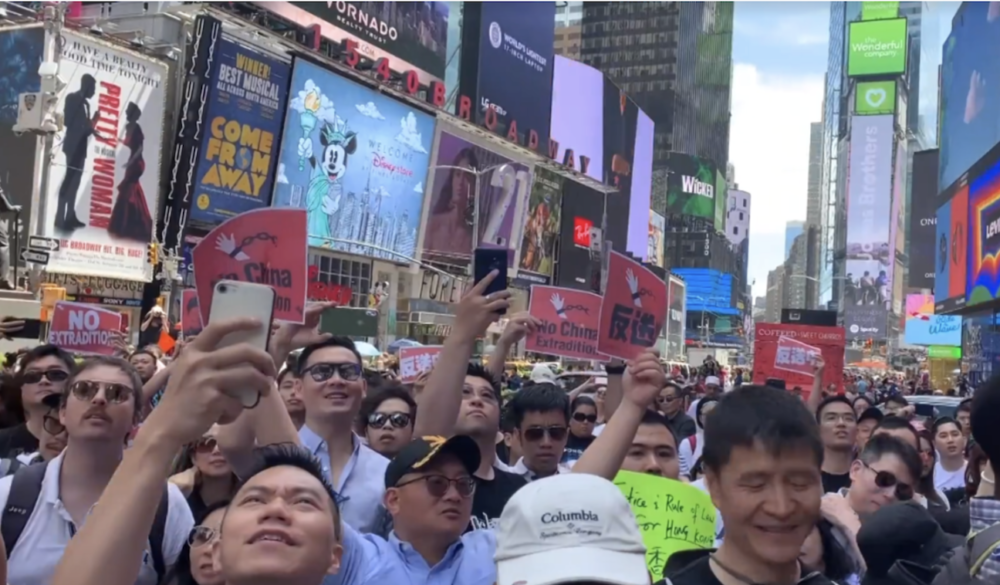
美国之音久岛摄影.By Madeline Ramirez, Staff Writer
Protests in Hong Kong began in opposition to a new extradition law that has since been withdrawn Photo [CC BY-SA 2.0] 2019 by 美国之音久岛摄影.
The latest protests alight in Hong Kong have rekindled the issue of Chinese influence in the United States. Americans have been actively siding with the protesters and their fight against the Chinese government’s suppression of Hong Kong’s reserved power. While the protests have incited police brutality and divisive perspectives in the Hong Kong region, the logistics of free speech have been called into question by corporations interested in Chinese trade.
A notable controversy emerged surrounding the NBA in which Houston Rockets General Manager Daryl Morey tweeted out the #standwithHK symbol along with the phrase, “Fight for Freedom. Stand with Hong Kong.” This was met with anger from the NBA’s Chinese fanbase, along with sponsor deals being put on hiatus and threats of game removal from the schedule. Two lower-level exhibitions connected to the Rockets team were canceled.
NBA Chief Communications Officer Mike Bass released an apology statement on Oct. 7 stating, “We recognize that the views expressed by Houston Rockets General Manager Daryl Morey have deeply offended many of our friends and fans in China, which is regrettable.”
The NBA is not the first corporation to control its employees’ expression to preserve Chinese relations. Blizzard Entertainment banned Chinese e-sports streamer Ng Wai Chung, screen name Blitzchung, from playing in the Grandmasters Blizzard tier after he donned a gas mask in a post game stream interview and said, “Liberate Hong Kong. Revolution of our age.” Blizzard also withheld any prize money he had won in his previous season, stating that Blitzchung had violated company rules prohibiting “Engaging in any act that, in Blizzard’s sole discretion, brings you into public disrepute, offends a portion or group of the public, or otherwise damages Blizzard image.”
Blizzard President J. Allen Brack announced in a news blog post that Blitzchung’s ban had been adjusted to six months. This change did not do much in slowing the onslaughts of criticism and outrage from the international gaming community, which has boycotted the company in protest. Senators Ron Wyden and Marco Rubio and Congress members Alexandria Ocasio-Cortez, Mike Gallagher and Tom Malinowski responded with a letter on Oct. 18 to Blizzard Entertainment expressing their concern with the company’s violation of free speech.
“Because your company is such a pillar of the gaming industry, your disappointing decision could have a chilling effect on gamers who seek to use their platform to promote human rights and basic freedoms,” they wrote.
Chinese influence has also been felt in the tech sector. HKmap.live was an application on the App Store designed to assist Hong Kong protesters in avoiding Chinese police and navigating past city closures. After pressure from Chinese government to remove the app, Apple complied and removed the app on Oct. 9 for violating store guidelines.
Even outside of the Hong Kong protests, American companies continue to cater to Chinese influence. The recent Dreamworks picture Abominable was developed for Chinese audiences and designed with the nation’s wishes in mind. The animated film was the first joint product between American Dreamworks Studios and Chinese Pearl Studio. In a scene depicting the main character’s room, the notorious nine-dash line was placed on a wall map. The nine-dash line is a territorial line placed on maps that portrays a large portion of the South China Sea as a Chinese territory. This line is not recognized by countries like Vietnam and Philippines, who have banned showings of the film.
The impending issue of free speech regarding Chinese issues is a complex one. American companies value China as a consumer base and make a large profit off distributed products, like technology and entertainment. But the ongoing Hong Kong dispute has stirred the American public and revealed a conflict over free speech versus controlled. Time will tell which direction American corporations will take in terms of cooperation with the Chinese government.





